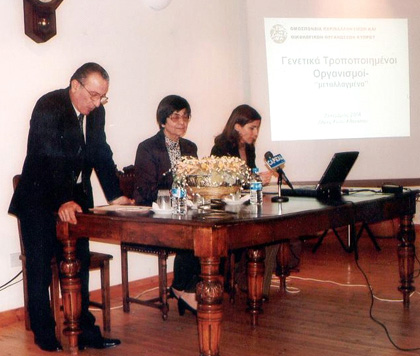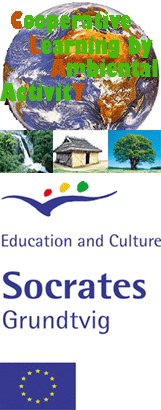|
|||||||||||||||||||||||||||||||||||||
|
|
Genetically Modified Organisms (GMOs) | ||||||||||||||||||||||||||||||||||||
|
AGIOS ATHANASIOS MUNICIPALITY
Organized several activities to inform the public and the schools of the Municipality about GMOs 
Photo: Mr. Nicolas Gerolemou –Vice Mayor , DR. Zannettou Androulla, Elpida Sioukri Genetically Modified Organisms (GMOs) Genetic engineering enables scientists of multinational biotech corporations to manufacture plants, animals and micro-organisms by manipulating genes in a way that does not occur in nature. The products of genetic engineering are living organisms that could never have evolved naturally. For example genes are transferred from fish to tomatoes, from human to rice etc. The GMOs as living organisms can reproduce and interbreed with natural organisms, thereby spreading to new environments and future generations in an unforeseeable and uncontrollable way. Complete disregard of the Precautionary Principle, inadequate testing and regulatory controls and usually false data supplied by the manufacturing companies mean that the harmful effects of GMOs may only be discovered when it might be too late. The damage may then be irreversible. For these reasons, GMOs must not be released into the environment. They pose unacceptable risks to ecosystems, and they threaten biodiversity, wildlife and sustainable forms of agriculture. Their release is "genetic pollution" and is a major threat because genetically modified organisms cannot be recalled once released into the environment. Their introduction into the complex ecosystems is a dangerous global experiment with nature and evolution. Coexistence of transgenic crops with conventional and organic farming is impossible due to the ability of these plants to transfer their foreign genes to cultivated and wild species, endangering biodiversity and farming. Especially in Cyprus coexistence is impossible, because of the small size of the agricultural plots and the lack of the option to set buffer zone around gm crops. The genetic modification has been mostly applied to crops of high commercial interest like maize, soya, cotton, oilseed rape, rice and to animals like cows and salmon. GMOs and substances produced of them are entering the food chain and great number of food products containing them, are consumed by people. Current understanding of genetics is extremely limited and scientists do not know the long-term effects of releasing these unpredictable organisms into the environment and people's diet. Evaluation studies are contacted by the same companies that produced the GMOs and not by independent organisations. Few independent studies and researches contacted are suppressed and defamed. However, their results confirm the fears of scientists and consumers worldwide, about the negative effects of GMOs on human health. Consumption of GMOs counts only few years, so long-term health effects are not yet recorded. But short-term effects, like allergies, have already been reported. The lack of labelling of these products disables medicine to apply the principle of cause and effect and therefore many health problems are difficult to relate them to GMOs. European Directives and Regulations demand labelling of products containing or consisting of authorised GMOs above 0,9%. The 0,9 threshold is not based on scientific data but on a compromise between EU and multinational biotech companies. Nevertheless, even this type of inadequate labelling is not applied, turning the consumers into guinea pigs. Meet and dairy products produced from animals fed with gm feed are not labelled. The Federation of Environmental Organisations of Cyprus in collaboration with Greenpeace promotes a petition to the European Commission, in order to press for the labelling of these important to human diet products. Although transnational biotech companies and their political supporters want us to believe that gm food is safe and thoroughly tested, growing awareness about its threats has created a global wave of rejection by consumers, farmers and food companies and retailers worldwide. Due to consumers pressure in Europe, supermarkets have cleared gm food from their shelves, food companies have removed gm ingredients from their products and pig and poultry producers have promised not to supply animals with gm feed. Thus it is obvious that the strength lies in the hands of citizens to press for rejection and banning of GMOs. The biotech companies promote GMOs by claiming that they are vital to feed the world and have a central role to play in enhancing agricultural productivity. This argument is based on the assumption that hunger is a result of food shortage. GM proponents ignore on purpose the fact that there is enough food to feed the world, and that the problems of malnutrition and hunger are a result of bad distribution, overconsumption in the so called ‘’western hemisphere’’ and because people in ‘’third world’’ are deprived of the money to buy food or the land to grow it themselves. Food security will not be achieved by technical fixes or even by increasing food production. It requires, among other things, respect to nature and people. European citizens are rejecting GMOs and as a result Local Authorities all around Europe are declaring their territories as GMO free zones. The Federation has launched a campaign in Cyprus at the beginning of 2005 aiming the declaration of Cypriot Local Authorities to GMO free zones. The Municipalities of Larnaca, Latsia, Germasogeia and Engomi have been declared so far. We advocate immediate interim measures such as labelling of gm ingredients, and the segregation of genetically modified crops from conventional ones. We oppose to coexistence and we demand 0% threshold of gm seeds. We also oppose all patents on plants, animals and humans, as well as patents on their genes. Life is not an industrial commodity. When we force life forms and our world's food supply to conform to human economic models and profit, rather than the rules of nature, we do so at our own risk. The planet and mankind do not need to pass through this unpredictable and horrifying experiment. GMOs must be banned immediately. ELPIDA SIOUKRI Member of Federation of Environmental and Ecological Organizations of Cyprus, Anti - GMO Organization
|
|
|||||||||||||||||||||||||||||||||||


